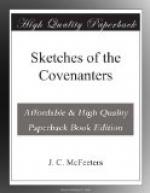The General Assembly, given strength from the Lord for the occasion, adopted a form of Covenant for the nation. The Covenant, as written by Rev. John Craig, was the product of a cultured brain and pious heart. It is unsurpassed in clear diction, high purpose, majestic spirit, heroic decision, and solemn appeal to God. It became the ground-work of all Scotland’s subsequent Covenants.
But Craig had to meet the test of faith required by his own Covenant. King James VI., who was now on the throne, after subscribing the bond, repudiated it, and commanded its author to do the same. Craig replied that he would never repudiate anything approved by the Word of God. The Court, in which he was on trial, ordered his head to be shaved, and other indignities to be done to his person.
Again when on trial he was treated with utmost contempt by his judge, to whom he said, “There have been as great men set up higher than thou, that have been brought low.” The judge, mockingly, sat down at his feet, saying, “Now I am humbled.” “Nay,” said Craig, “mock God’s servants as thou wilt, God will not be mocked, but shall make thee find it in earnest, when thou shalt be cast down from the high horse of thy pride.” A few years later he was thrown from his horse and killed.
The fervor aroused by the Covenant swept the Church like a Pentecostal fire, and spread over all the kingdom as a storm of holy excitement. The Covenant bond, being signed by the king, the nobles, and a great multitude of people, was called, The First National Covenant of Scotland.
No greater event had ever stirred the kingdom, no deeper joy had lighted up her coasts, no higher honor had exalted her people, no brighter glory had overspread her mountains and moors. That holy Covenant had lifted her into relationship with God; the kingdom had become Hephzibah, and the land, Beulah; the nation was married to the Lord.
The Covenant bound the Covenanter, the Church, the nation, and posterity, under a solemn oath,—
To adhere to the Reformed religion with all the heart through all time to come;
To labor with all lawful means to recover the purity and liberty of the Gospel, by removing all human innovations from the Church;
To abhor and detest the corrupt doctrines and practices of Romanism;
To resist under the oath of God all the evils and corruptions contrary to the Reformed religion;
To defend the country and support the government, while country and government defend and preserve true religion;
To stand in mutual defence of one another in maintaining the Gospel and the Reformed Church;
To permit nothing to divide the Covenanted ranks, or diminish their power, or swerve them from their high purpose;
To become good examples of Godliness, soberness, and righteousness in the performance of every duty due to God and man;
To fear none of the foul aspersions that may be cast upon this Covenant, seeing it is warranted by the Word of God, and is for the maintenance of His Church;




